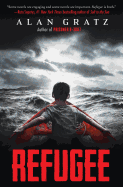
Conversations about refugees are often heated, focused on hypotheticals and unknowns. By making visible three young emigrants--rather than those who fear them--Refugee aims to provide a corrective to this American myopia. Josef, 12, is escaping Germany in the late 1930s; after his father is released from Dachau, his Jewish family scrambles aboard the ill-fated German liner St. Louis. Isabel, 11, is escaping Cuba in 1994, leaving in a handmade boat for a better life, one that includes more opportunities for her future as well as keeping her activist father out of Castro's prisons. And Mahmoud, 12, leaves Aleppo, Syria, in 2015 with his family in a panic after their apartment building is bombed. Moving briskly among Josef, Isabel and Mahmoud, each short chapter brings new tragedy, occasional hope and continued instability to all three children.
Alan Gratz (Code of Honor; Projekt 1065; The League of Seven; Prisoner B-3087) uses his trademark straightforward prose to illuminate the danger facing refugee families. Insightful details help contemporary readers to connect with the story, especially in Mahmoud's chapters, in which smartphones play an important role ("Google Maps told them it would be an eight-hour walk, and they split the journey up by sleeping in a field"). Gratz focuses on individual villains and heroes, rather than structural causes of refugee crises, but nevertheless young readers will finish this book and ask: What should we do? Adults will be similarly struck by the words of Isabel's grandfather: "[A] funny thing happened while I was waiting for the world to change, Chabela: It didn't. Because I didn't change it." --Stephanie Anderson, assistant director for public services, Darien Library (Conn.)

